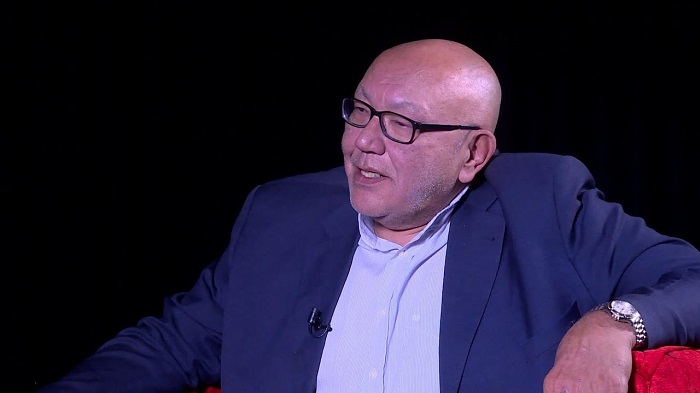‘I am pleased to say that our bilateral relations are currently on the rise after a period of certain stagnation. We have intensified official traffic and our search for mutually beneficial areas of cooperation. Our governments and corresponding structures are hard at work to determine specific areas of interaction. The sides are looking for opportunities to expand trade turnover, joint economic projects, and cultural collaboration.’
Asgar Aitmatov, former foreign minister of Kyrgyzstan, president of Chingiz Aitmatov Issyk Kul Forum, and the son of the visionary writer Chingiz Aitmatov talks about the promising prospects of Azerbaijan-Kyrgyzstan cooperation in his exclusive interview to AzVision.az. He reminds me of President Sadyr Japarov’s official visit to Baku in April, last year. President of Azerbaijan Ilham Aliyev is also planning a return visit to the Kyrgyz Republic. The official representatives of our two countries have started talking about a qualitatively new level in bilateral relations.
- How do you assess the bilateral relations between Azerbaijan and Kyrgyzstan? Are you satisfied with the cooperation we have? What can we do to improve?
‘Our relations entered a revival stage as Baku received the anticipated crucial signal from Kyrgyzstan. Our country recognized Karabakh as an integral part of Azerbaijan and supported all efforts to restore its territorial integrity. The civil society in Kyrgyzstan also played an important role in the matter: At the very peak of military operations in Karabakh, the society started the Kyrgyz Friends of Azerbaijan club in Bishkek, expressing their full support to the Azerbaijani army and the Supreme Commander-in-Chief at the founding conference.
I am certain that we have great potential to develop both bilateral and multilateral relations within our enhanced cooperation in the Organization of Turkic States. Our elevated collaboration will significantly help relaunch direct flights between Baku and Bishkek. People now have to fly halfway around the globe, laying over in Istanbul, Dubai or Moscow, in order to travel between Baku and Bishkek.’
- How do you see the role of the OTS in strengthening unity among the Turkic world? What other ideas and projects can the organization carry out to be more efficient?
‘Multilateral cooperation platforms for Turkic states such as the OTS, TURKSOY International Organization of Turkic Culture, TURKPA Parliamentary Assembly of the Turkic States and International Turkic Culture and Heritage Foundation have become an important factor in the international lives of our countries. These organizations should contribute to the gradual rapprochement of our countries and peoples, a deeper mutual understanding, formation of a common identity, joint economic and cultural projects, as well as development of common positions on international and regional challenges.
I believe TURKSOY has proven to be the most efficient and has turned into a Turkic UNESCO of sorts, making crucial contributions to the cultural rapprochement of our peoples. How efficient the other Turkic unions can be, depends on how responsibly the participating countries carry out the undertaken agreements and obligations and how interested they are in taking part in taking the Turkic unity further. The Turkic world has vast integration potential. It all comes down to political will and resources.’
- What do you think about the prospects of a peace agreement between Baku and Yerevan through the mediation of Russia and Brussels?
‘I strongly believe that we must try our best to have a peace agreement on our hands in the nearest future. Azerbaijan liberated a significant part of Karabakh during the 2020 military operations, which enabled the tripartite ceasefire agreement, mediated by Russia. The agenda today is to maintain the ceasefire, and prevent provocations on the contact line, thereby building necessary conditions for a peaceful settlement.
The foreign players involved in the Karabakh problem, the Russian Federation, the US and the EU, are focusing on the war in Ukraine, which may affect the pace of the settlement process. Overall, conflicts around territories tend to be the most violent and long-lasting ones, as proven by world practice and post-Soviet history. I hope the day will come when we will have all the conditions to sign a peace treaty. For now, we are happy that the parties to the conflict are able to start a dialogue. I am referring to the recent negotiations between the foreign ministers of Azerbaijan and Armenia in Tbilisi.
In a broader context, the principle of respect for territorial integrity and independence of post-Soviet states is being questioned increasingly, which is rather worrisome. Perhaps it would be wise to consider adopting a Eurasian version of the 1976 OSCE Helsinki Act to ensure multilateral guarantees of respect for each other’s territorial integrity and sovereignty among all former Soviet republics.’
- Russian peacekeepers have been stationed in Karabakh for 5 years. How do you think the situation will develop? Will the peacekeepers withdraw from Karabakh in 5 years, or will we have another Transnistria and South Ossetia situation on our hands?
‘The presence of Russian peacekeepers on the contact line in Karabakh is crucial for the ceasefire agreement. I hope that the five-year mandate will be enough for Baku and Yerevan to reach an agreement, mediated by international partners. Until then, the presence of the Russian Federation in Karabakh as a guarantor for not resuming military operations serves the interests of both Azerbaijan and Armenia.
AzVision.az Analytic Group
More about:














































